9 Ways Winter Can Hurt Your Health
Why your skin is flaking, your joints are aching and more.
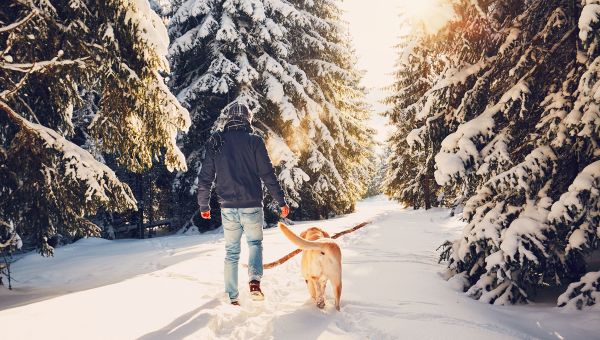
Ever wonder why cold weather might make you look and feel years older? From dry skin to poor circulation to weight gain, winter can wreak havoc on your system. We spoke with Scott Joy, MD, an internal medicine doctor at Presbyterian/St. Luke's Medical Center in Denver, Colorado, to learn the science behind cold-weather side effects.
Here are nine ways winter affects your health. Plus, get tips on how to take care of yourself when the temperature drops.
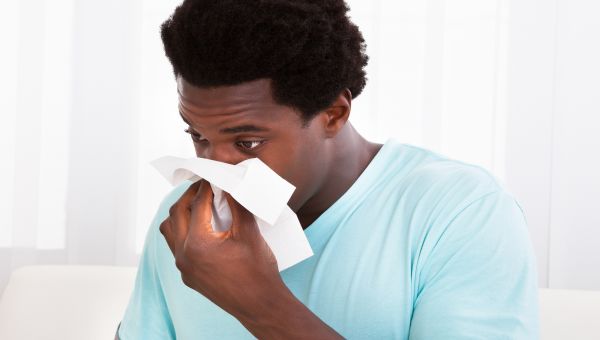
YOU GET SICK OFTEN
You may know that winter is cold and flu season. And you may have heard warnings from health experts about the dangers of flu season overlapping with the spread of COVID-19.
“It's a concept called crowding,” explains Dr. Joy. “We huddle together and spend more time indoors. Family, friends and coworkers all come closer together and share germs.”
What’s more, winter air is drier, which some experts believe enables viruses to persist longer. On top of that, dry mucous membranes may have a harder time resisting germs. Changes to your sleep cycle, which come from the shorter days, can weaken your immune system, as well.
Keep COVID-19, the cold and the flu from spreading by:
- Getting your flu shot
- Covering your mouth and nose with the crook of your elbow or a tissue to keep germs from landing on your hands when you cough or sneeze
- Washing your hands frequently
- Wearing a mask over your nose and mouth when you’re around people you don’t live with
- Practicing social distancing
- Avoiding large indoor gatherings
- Cleaning high-touch surfaces regularly
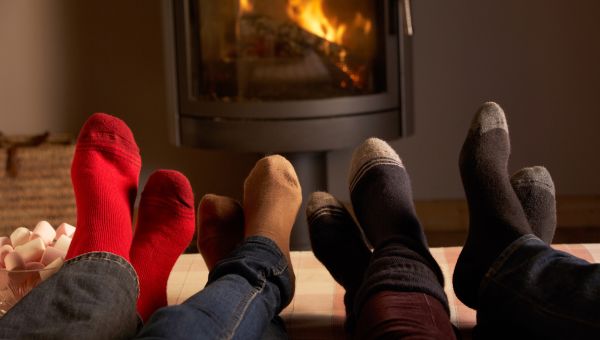
YOUR TOES FEEL NUMB
Our bodies are built for survival, even in the bitter cold. When you step outside, blood vessels near your body’s surface tighten. That pushes blood toward the organs that help you think clearly and move quickly until you can find shelter. Warm, oxygen-rich blood is sent to your brain, heart and lungs, and is directed away from your limbs, says Joy. That’s why your fingers and toes go numb if they’re not bundled up.
If you have poor circulation from a condition like diabetes or peripheral artery disease, you’re especially prone to numb feet. That increases your risk for falls and injuries. Protect your feet by always wearing socks and shoes in cold weather and by visiting a healthcare provider regularly.
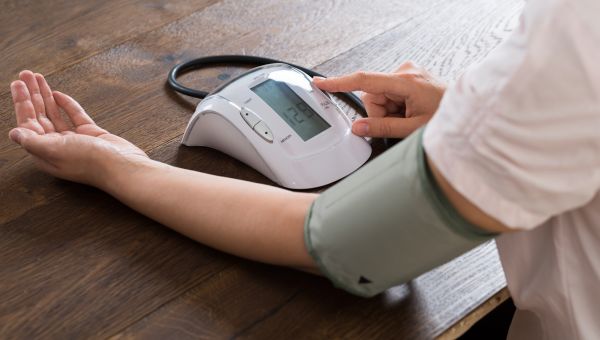
YOUR BLOOD PRESSURE GOES UP
Indulgent holiday foods may contain more salt, which raises blood pressure. Throw in extra couch time and less outdoor exercise, and the season can be an especially high-risk time for people with heart conditions, explains Joy.
Invest in a blood pressure monitor from the drug store and check your numbers regularly. For most people, blood pressure should be below 120 for the top number and below 80 for the bottom number.
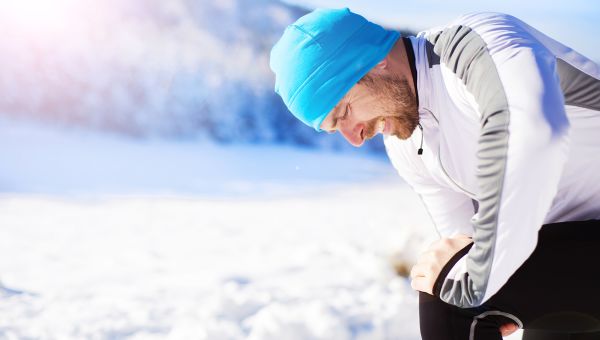
YOUR JOINTS FEEL STIFF
Do your joints have the uncanny ability to predict the weather? If so, they may feel particularly stiff on chilly winter mornings. Changes in air pressure can cause joint pain, especially before storms, and low temperatures can reduce flexibility and lead to stiffness.
“Think of your tendons as rubber bands,” says Joy. “If you expose a rubber band to cold temperatures, it becomes less flexible. Cold weather tightens up the ligaments and tendons, which are the structures that support your joints.”
Create a morning stretching routine to loosen your joints and ease stiffness before stepping out into the cold. Stretching can help wake you up, get your blood flowing and prevent injuries.
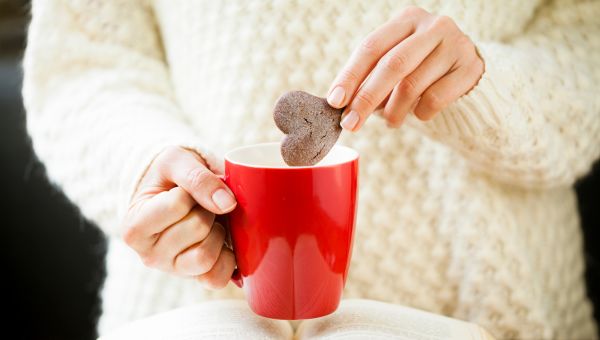
YOU PUT ON WEIGHT
When the days get short and chilly, the temptation to stay indoors, binge watch your favorite shows and munch on holiday cookies can be pretty strong. “For many people, winter brings the perfect storm of exposure to excess calories and lower activity levels,” says Joy.
The reason for cold-weather cravings? Possible explanations include:
- Carbs boost a feel-good brain chemical called serotonin, which your body may be craving to help fight off winter blues.
- You’re less active in winter, which means your appetite may increase. On the flipside, being active suppresses your appetite to a certain extent.
- Fatty, high-carb foods are more comforting. This can make them your number one choice at the end of a long, cold day.
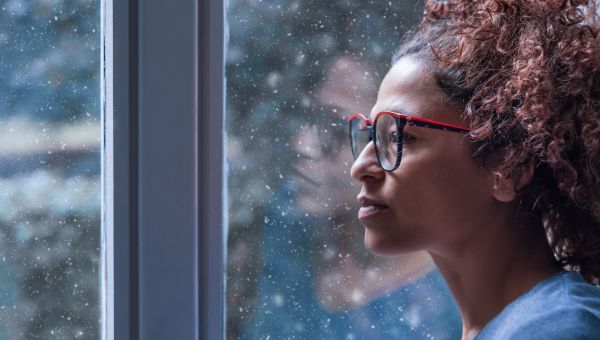
YOU FEEL TIRED AND SAD
Seasonal affective disorder (SAD) is a type of depression that comes and goes with the seasons, explains Joy. Other symptoms of SAD include:
- Sleeping too much or too little
- Feeling tired all the time
- Feeling mentally slow or sluggish
If you think you have SAD, reach out to a counselor. Up to 60 percent of people with SAD have never been treated for depression, even though it’s highly treatable. Options include the use of a special light box that mimics natural light on dark mornings. Light therapy can boost your mood and improve your symptoms in as little as a few days.
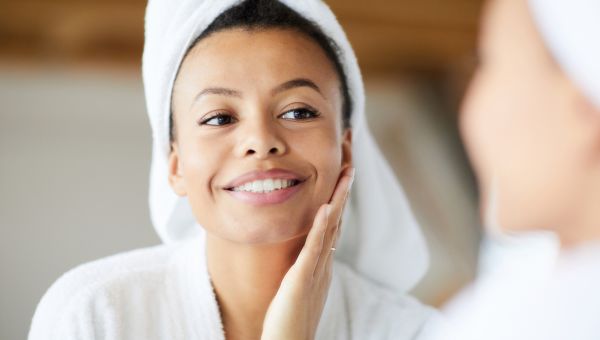
YOUR SKIN IS DRY AND FLAKY
Your skin may dry out in the winter because cold air contains less moisture. You might also be washing your hands more, or using hotter water to shower and wash your hands, which dries your skin even further.
If the cold air has your face flaking and your hands chapped, it’s time to break out some heavy-duty moisturizer. Pick a product with ceramides, which replace your skin’s natural oils. Remember to moisturize right after you get out of the shower, when your pores are open and absorbent because of the steam. Also, use warm water instead of hot water when possible.
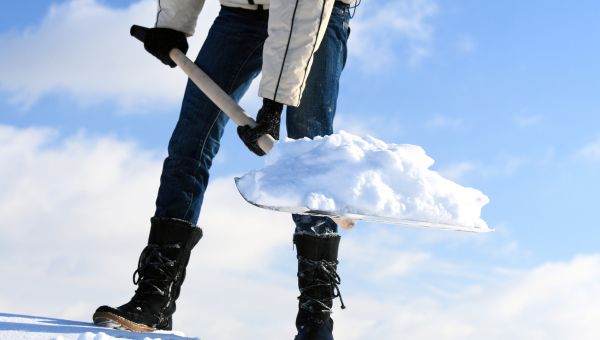
YOU RAISE YOUR HEART ATTACK RISK
Snow shoveling sends about 11,000 people to the ER every year. It raises your risk for dangerous falls, back injuries and heart attacks.
Part of the reason why shoveling increases heart attack risk is the exertion it requires. Shoveling causes a spike in the energy you need to use, causing your heart rate to go up dramatically.
If you have a heart condition, don’t shovel. If you’re a healthy adult, avoid shoveling first thing in the morning, when heart attacks are more likely to occur. Other tips: Bundle up, stay hydrated and stop to call 911 if you feel chest pain, shortness of breath or any other heart attack symptoms.
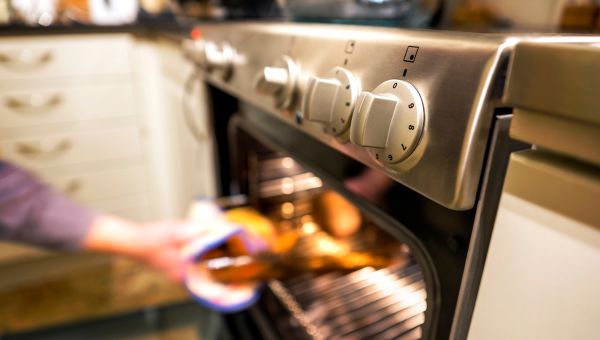
YOU UP YOUR RISK OF CARBON MONOXIDE POISONING
Another way winter could land you in the hospital? “There are around 20,000 ER visits in the U.S. each year due to carbon monoxide (CO) poisoning,” says Joy. “About 4,000 people are hospitalized and 400 die from it.” Poisoning can happen when people use unsafe heating practices such as turning on their oven and leaving the oven door open.
To prevent carbon monoxide poisoning:
- Don’t use charcoal grills or camp stoves in the house.
- Don't use your oven as a heater.
- Don’t try to warm your car in the garage—even with the garage door open.

Harvard Health Publishing. “Out in the cold.” January 2010. Accessed October 9, 2020.
J Brainard, M Gobel, et al. “Health implications of disrupted circadian rhythms and the potential for daylight as therapy.” Anesthesiology. May 2015. 122(5), 1170–1175.
Centers for Disease Control and Prevention. “Coronavirus Disease 2019 (COVID-19): How to Protect Yourself & Others.” September 11, 2020. Accessed October 20, 2020.
HBasit, TJ. Wallen, C Dudley. “Frostbite.” StatPearls. Treasure Island (FL): StatPearls Publishing; 2020 Jan.
American Heart Association. “Understanding Blood Pressure Readings.” 2020.”
American Heart Association. “Hypertension Guideline Resources.” October 26, 2018. Accessed October 22, 2020.
JS Petrofsky, M Laymon, & H Lee. “Effect of heat and cold on tendon flexibility and force to flex the human knee.” Medical Science Monitor: International Medical Journal of Experimental and Clinical Research. August 12, 2013. 19, 661–667.
Institute of Medicine (US) Committee on Military Nutrition Research; Marriott BM, Carlson SJ, editors. Nutritional Needs In Cold And In High-Altitude Environments: Applications for Military Personnel in Field Operations. Washington (DC): National Academies Press (US); 1996. 7, Physiology of Cold Exposure.
UpToDate.com. “Seasonal affective disorder: Treatment.” September 2020. Accessed October 9, 2020.
UpToDate.com. “Seasonal affective disorder: Epidemiology, clinical features, assessment, and diagnosis.” September 2020. Accessed October 9, 2020.
Cleveland Clinic. “Yes, Shoveling Snow Can Actually Be Dangerous to Your Heart.” March 5, 2020. Accessed October 9, 2020.
Harvard Health Publishing. “Protect your heart when shoveling snow.” January 15, 2011. Accessed October 9, 2020.
Centers for Disease Control and Prevention. “Carbon Monoxide Poisoning.” January 3, 2020. Accessed October 9, 2020.
Centers for Disease Control and Prevention. “Carbon Monoxide Poisoning: Routine Surveillance.” December 27, 2019. Accessed October 9, 2020.
More On


video

article

slideshow


video


video
